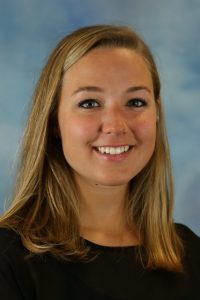 The 24th Annual Howard B. Eisenberg Do-Gooders’ Auction on behalf of the Law School’s Public Interest Law Society (PILS) will be held on February 17 at the Law School. Proceeds from the event go to support PILS Fellowships to enable Marquette law students to do public interest work in the summer. Natalie Lewandowski, a current law student, shares her experience here as a PILS Fellow.
The 24th Annual Howard B. Eisenberg Do-Gooders’ Auction on behalf of the Law School’s Public Interest Law Society (PILS) will be held on February 17 at the Law School. Proceeds from the event go to support PILS Fellowships to enable Marquette law students to do public interest work in the summer. Natalie Lewandowski, a current law student, shares her experience here as a PILS Fellow.
Where did you work as a PILS Fellow?
I worked at the Milwaukee Justice Center (MJC) in the Milwaukee County Courthouse.
What kind of work did you do there?
Most days I worked in the Family Forms Clinic with other MJC volunteers and supervising attorneys, helping clients with minor forms they wanted to file in the courthouse, such as divorce forms or forms to modify placement and custody orders for their children. The vast majority of these clients cannot afford an attorney, but earn slightly above the (extremely low) federal poverty level, so they don’t qualify for free legal aid, either. The only practical option for these people may be to represent themselves in the matter. That’s where the volunteers at the MJC come in, helping these clients with the forms and guiding them through the process of how and where to file them in the courthouse and what the next steps might be.
I also helped plan and execute the MJC’s annual 5K Run for Justice, which raises money for the MJC to continue helping people access the justice system (and was really fun!). In addition, I did some work with the MJC’s Mobile Legal Clinic, which is an amazing project that brings the services of the MJC—including brief legal advice by attorneys—to places in the community where it’s hard for residents to make it to the MJC for free legal help.
How was the experience meaningful to you?
It was so meaningful to interact with members of the community who really needed help navigating the justice system. These are people who have legal issues with which they need help, and do not have the resources to get help from an attorney. If it weren’t for the volunteers at the MJC, they’d pretty much have to represent themselves blindly.
I was expecting many of these people to be hardened and upset—after all, many of them were coming in to start the process of divorcing a spouse, or to fight for more court-ordered time with their children—but I was surprised at how grateful and kind so many of them were. Even if I couldn’t help them as much as I wanted to or give them the answers they were looking for, a lot of clients were thankful that someone like me was merely willing to listen to them.
What did you learn in the course of your work?
Aside from doing pro bono work here and there, this was one of my first times working alongside attorneys—in fact, it was one of my first times even being in a courthouse—so I got my feet wet with almost every real-world aspect of the law. It’s one thing to study civil procedure or contract law in a classroom, and it’s entirely another to interact with those areas of law in the context of a real person who’s sitting in front of you with a real legal issue that directly affects his or her life.
What do you like best about doing public interest work?
I like knowing that I will be able to look back on a career in public interest law and really know that I made a difference. I like it because it helps me recognize my privilege and use that privilege, in the context of my legal education, to help some of the most marginalized people in our community.
What are you doing to help with the PILS Auction?
I am Vice President of the Auction Promotions team, so I’ve been helping promote the event on social media and throughout the school. Among other things, I’ve been posting featured “PILS Auction Items of the Day” on our Facebook event page to help pique interest in some of the items up for grabs this year.
